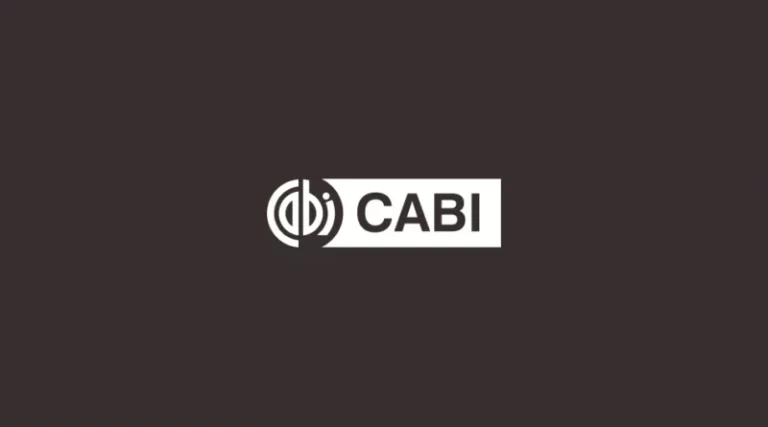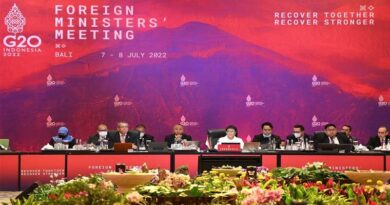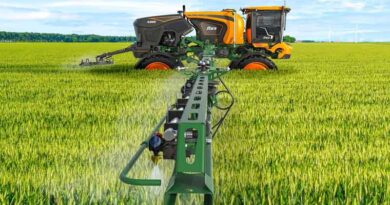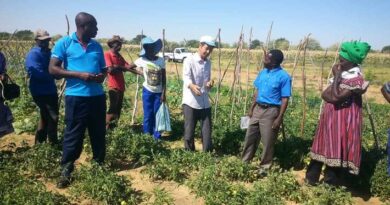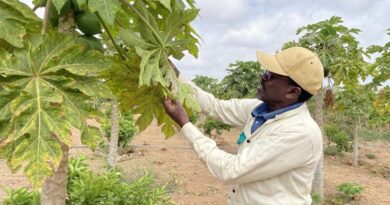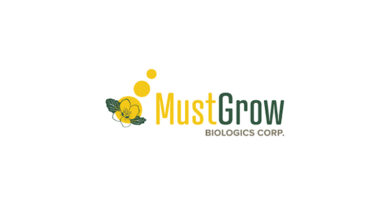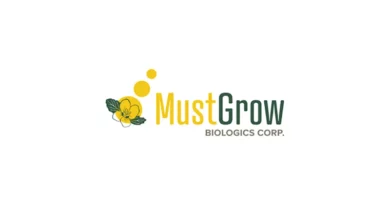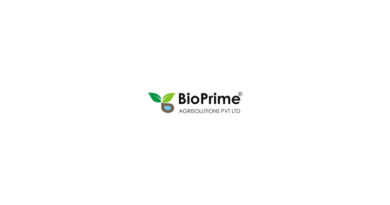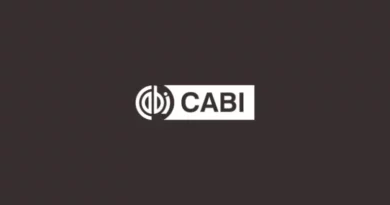Tripartite south-south cooperation to support Botswana develop the digital knowledge hub for greater food security
17 October 2023, Africa: CABI is working with the Chinese Academy of Agricultural Sciences (CAAS) as part of a tripartite south-south cooperation and technical exchange to support Botswana develop a digital knowledge hub to foster greater sustainable food security.
A comprehensive needs assessment is being carried – at the request of Botswana’s National Agricultural Research and Development Institute (NARDI) to support the government’s commitment to establishing a knowledge-based economy.
The work started with a week-long needs assessment mission to Botswana including a stakeholder roundtable event, focus group discussions, key informant interviews and site visits to NARDI facilities. These included the Knowledge and Innovation Centre – the host of the proposed Knowledge Hub.
National Veterinary Lab, Library, Soil Lab, and Kanye Research and Innovation Centre (KRIC)-Food Science Lab.
Other site visits included a farm in Mosisedi, the Botswana Institute for Technology, Research & Innovation, the University of Botswana, and the Centre for Coordination of Agricultural Research and Development for Southern Africa (CCARDESA).
Healthier, higher yielding and more profitable crops
It includes CABI and CAAS working with NARDI to see how digital knowledge products and services can help Botswana’s smallholder farmers grow healthier, higher yielding and more profitable crops free from pests and diseases.
The NARDI Executive Director of Technology Transfer and Commercialisation, Dr Martin Kebakile, gave a presentation on NARDI organisational structure, plan for the Knowledge Hub, and perceived support required from CABI/CAAS.
In his opening remarks, Dr Kebakile highlighted the aspirations of Botswana to transition from mineral-based economy to knowledge-based economy to ensure sustainable economic growth.
He also mentioned the national milestones stipulated in the RESET Agenda, the mindset change, the need for value chains development, and digitization to effectively and efficiently deliver our products and services to target recipients.
Dr Kebakile said, “This is what has brought us together this morning, to figure out how we can build a digital platform that we can leverage on to deliver knowledge that can assist our farmers, near and far, to improve their productivity.
“We need to build a digital platform that we can leverage on to deliver knowledge that can help Botswana (with a farmer in mind, near and far) to improve their productivity.”
Supported by experts across CABI, a four-member team, who carried out this needs assessment mission to Botswana, consisted of Dr Qiaoqiao Zhang, Director of Memberships, Dr Noah Phiri, Regional Representative for Southern Africa, Dr Wan Min, Senior Co-ordinator, East Asia and Southeast Asia and Professor Kou Yuantao, Head of the Digital Library Team at the Agricultural Information Institute of CAAS.
NARDI is the best institute to build the knowledge hub
Useful discussions with the core teams of NARDI and key stakeholders of the proposed knowledge hub were held. The stakeholders stated that NARDI is the best institute to build the knowledge hub as a national research institution and to help Botswana achieve its vision of a knowledge-based economy.
It is hoped that a needs assessment on establishing a knowledge hub in Botswana will ultimately help enhance the country’s capacity to use digital data and associated tools to mitigate the threats its food systems, ecosystems, and biodiversity.
CABI has already been supporting Botswana, one of its 49 Member Countries, to better manage the threats posed to food production by invasive species such as the devastating maize pest the fall armyworm (Spodoptera frugiperda).
Since 2019, CABI has been working in partnership with the Food and Agriculture Organization of the United Nations (FAO) as part of its Global Action for Fall Armyworm Control to help farmers in Botswana ‘close the net’ on the pest.
The FAO has rolled out a mobile phone app technology under the Fall Armyworm Monitoring and Early Warning System (FAMEWS), which is proving to be a key weapon in the hands of smallholders who are helping to map the current situation. CABI’s invasive species scientists and development communications specialists worked with FAO to promote the usage of FAMEWS.
Dr Noah Phiri, CABI’s Regional Representative, Southern Africa, said, “By conducting a needs assessment for Botswana we will have a better understanding of what the country really needs and what is required to establish a knowledge hub.
“This includes an analysis of both current and desired knowledge management practices in Botswana and identification of gaps, needs and priorities.”
Dr Phiri added that the assessment will also include information to estimate the potential cost of establishing a knowledge hub, and evidence to support applications for third party funding for it.
Publishing products and digital tools showcased
Publishing products and digital tools were showcased, as well as membership benefits outlined by Dr Zhang, at the stakeholder roundtable event. These included those which could be potentially utilized as part of a digital knowledge hub.
For example, a wide range of CABI publishing products are now accessible via the CABI Digital Library, and the PlantwisePlus Toolkit includes resources and tools such as the BioProtection Portal, PlantwisePlus Knowledge Bank and Fertilizer Optimizer Tool.
Furthermore, learning, and educational resources highlighted at the meeting – the likes of which could also benefit the creation of a digital knowledge hub – included those from the CABI Academy.
The CABI Academy brings together CABI’s expertise in crop health, agricultural advisory services, and digital development to create a range of online training courses and certifications that develop and build plant health skills.
As part of the stakeholder roundtable event, Professor Kou Yuantao, Head of the Digital Library Team at the Agricultural Information Institute of CAAS, highlighted how his organization can support the creation of the digital knowledge hub.
Professor Kou said, “It is my honour to be involved in this meaningful activity together with CABI, which is in line with the international cooperation policies of China. We hope that we could carry on making valuable contribution to the establishment of the Knowledge Hub of NARDI.”
It is anticipated that these focus group discussions, key informant interviews and site, laboratory and field visits carried out, and continued interactions with NARDI and their stakeholders can further inform the needs assessment before the digital knowledge hub is created.
Also Read: International Tractors Limited (ITL) launched 5 new tractor series under the brand Solis
(For Latest Agriculture News & Updates, follow Krishak Jagat on Google News)

